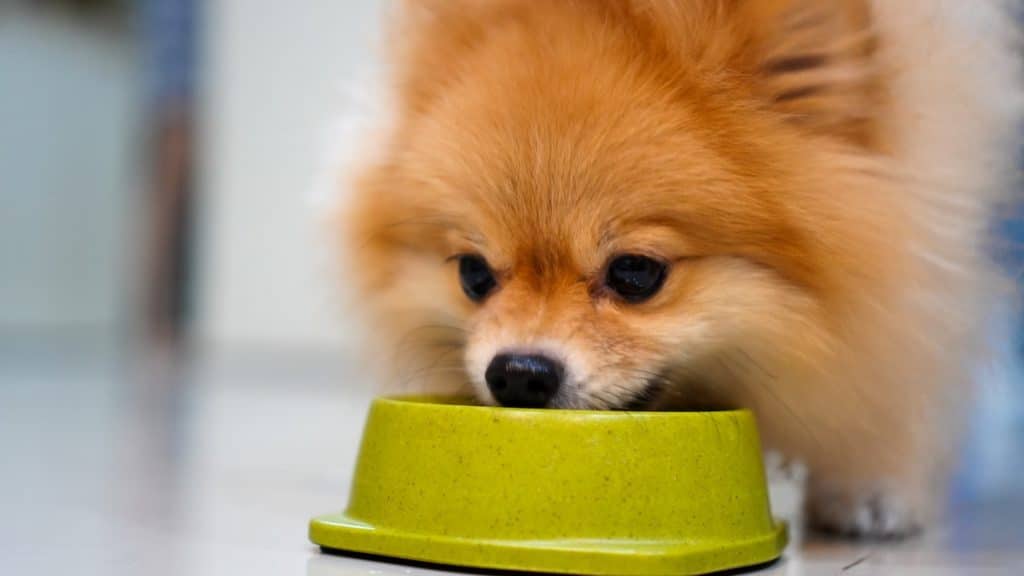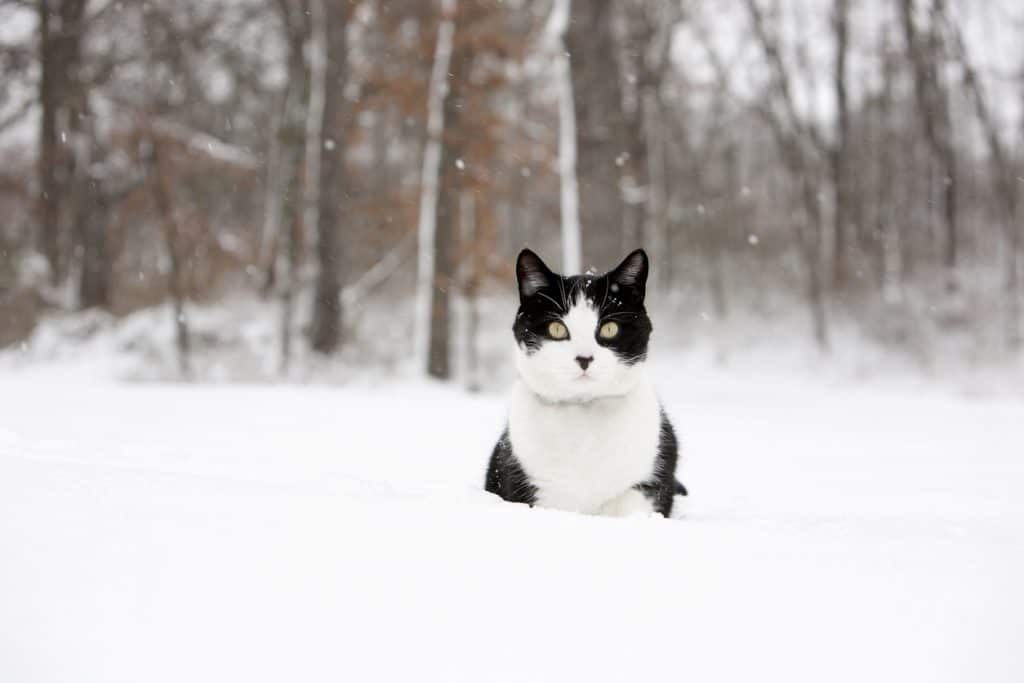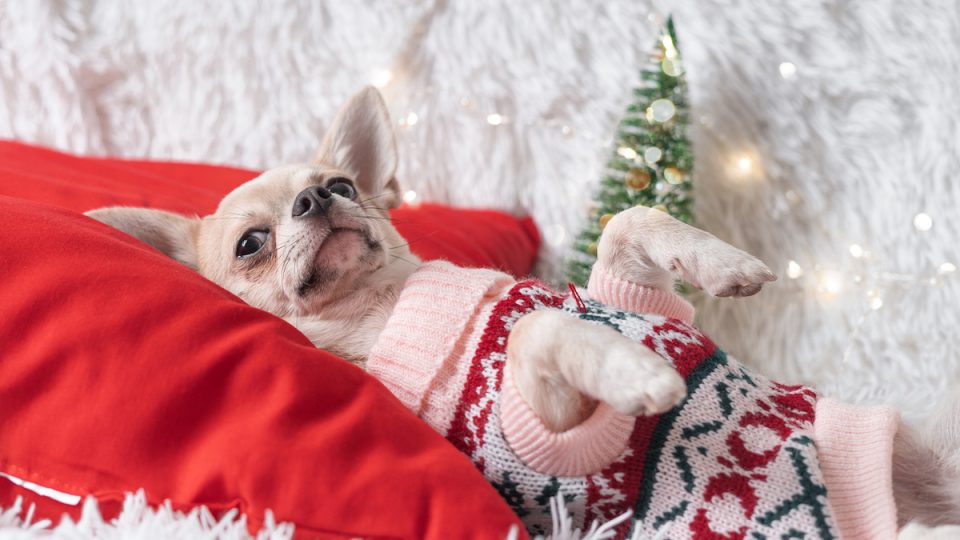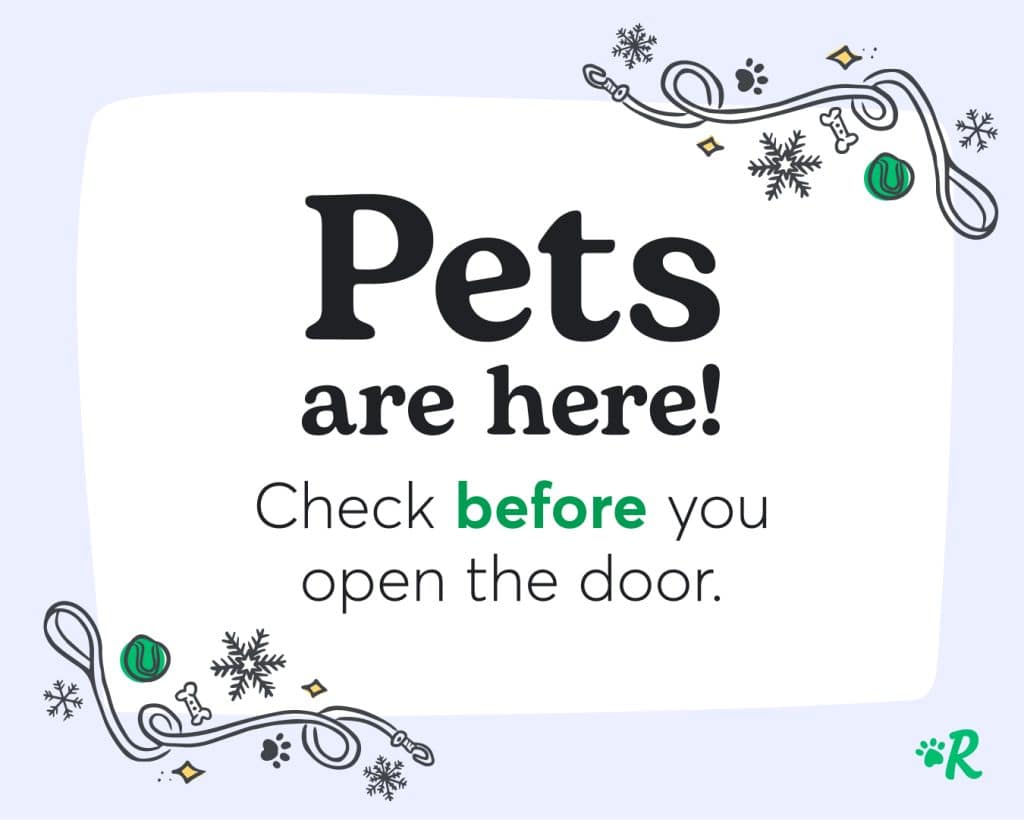The holidays can bring joy, togetherness, and excitement for all non-furry and furry family members. However, before you put your feet up with the King’s speech and whatever’s happening to Doctor Who in this year’s Christmas special, you should be taking extra steps to make the holidays as comfortable and enjoyable as possible for your pet.
Cats and dogs might love guests, and the surplus of gifts and family time may be at the top of their letter to Santa. However, the holidays can also bring a lot of unexpected foot traffic, tempting (but dangerous) human food, potentially harmful candles and decorations, freezing weather, and changes to the home that need navigating to keep your pet safe.
However, with the right training and a few precautions, you can make the holidays a special time for you and your pet while keeping them safe, calm, and comfortable. Here’s a dog holiday guide to help you give them the best winter break.
1. Let Your Pet Unwrap a Gift
Giving your pet the right gift is bound to trigger enthusiastic tail wags or joyous meows. There’s no better soundtrack to the holidays. However, the age-old question remains: what do you get a spoiled pooch or moggy who already has everything they could possibly desire?
“You know your pet best,” says Nicole Ellis, Certified Professional Dog Trainer. “Pick a toy based on their play style and habits. A durable, strong chew will bring more joy and enrichment over time than a stuffed toy to a power chewer. A dog that loves soft toys won’t get much use of a super hard, indestructible toy.”
Rover’s veterinary expert, Dr. Rebecca Greenstein, urges similar discretion. “If you have a known power chewer, or a large breed, curious puppy, or dog with a tendency to swallow small objects or rip toys apart, avoid adding the ultra-cute holiday-themed plush fabric squeaky toys to your trolley.”
Be cautious of extra hard chews and toys, too, Greenstein says: “Us vets have a motto: ‘If you wouldn’t want to get hit in the knee with it, then it’s too hard to give your pet!”
Ellis and Greenstein say the practical approach is the way to go when shopping for pets. “What pet parent wouldn’t appreciate an accessory like collapsible travel pet bowls or an adorable new poo bag holder?” Greenstein says. Ellis likes giving gifts that provide mental enrichment. “Kongs and the Kong Wobbler are favourites of mine.”
If you’re considering a warm (but embarrassing) seasonal jumper or matching family pyjamas for your pet, make sure you know how to measure your pet for clothing properly. Dr. Maria Baker, DVM, a chief veterinarian at Pet-How, recommends the following steps:
- Make sure your dog is standing up when measuring them.
- Place the tape around the broadest part of their chest, making sure it’s not too tight.
- Note the measurement.
- Measure their neck, keeping the tape comfortable and close to the collarbone.
Plus, part of the gift could be letting your pet open their gift themselves! Dogs love shredding paper as a nod to their evolutionary prey drive. Just be sure to supervise it and prevent them from swallowing it where possible, as well as avoiding decorative wrapping like ribbons or tinsel that can become stuck in their digestive systems.
2. Train Your Pet to Be a “Good” Boy or Girl
When you have guests with kids or other pets, it’s better for your own to be a cherub rather than a Scrooge (or a Buddy the Elf – even well-meaning pups can cause chaos if they’re too excited). While the holidays are a time to cherish being with loved ones, the sights, sounds, and smells can be overstimulating or stressful for many pets.
Instilling “place” training or “down” and “settle” commands can also help keep your dog calm and polite around guests. Teaching dogs to control their impulses when greeting guests or asking for treats can help them stay on top of their manners, especially the “wait” command, which can keep them safe from bolting out of doors.
Remember that positive reinforcement is the key to maintaining calm, polite behaviour in dogs in a way that keeps them happy and fear-free. Exercising your dog ahead of any visitors arriving, staying calm yourself, and having guests ignore the dog until they chill out can also help you prevent your dog from jumping at guests who might not be up for it.
3. Prepare Holiday-Themed Treats
If you want to make your dog’s holiday extra special, why not prepare treats using seasonal ingredients they love? These might include:
- Ground cinnamon
- Honey
- Apple sauce
- Shredded, cooked turkey
- Dried cranberries
- Canned or pureed pumpkin
- Low-sodium chicken broth
- Peanut butter
- Egg
- Cheese
Cats may prefer fish, chicken, salmon, mackerel, and other meaty delights with grains, cheese, and vegetables like carrots. Perhaps you’re too busy preparing a three-course dinner for your human loved ones to make special biscuits. Luckily, a range of delicious treats are available on supermarket or pet shop shelves, including:
- Wagg’s reindeer-themed range of Christmas specials (along with other festive flavours)
- Denzel’s series of Christmas gift treat boxes (including gingerbread)
- Scrumbles’ dog treat advent calendar
Your floof will be grateful either way.
Holiday food safety reminders
Of course, your pet deserves the best nosh when the rest of your family is chowing down, but remembering to keep them away from toxic foods (and massive portions) is vital. Bone broth, sour cream, cheese, and turkey are safe in small quantities for your pets. At the same time, they should stay away from alcohol, fried food, chocolate, onions, garlic, raisins, salt and holiday staples like stuffing.

Aonip via iStock
Any food cooked in spices or other food can be seriously harmful to pets. However, you can prepare a little unseasoned poultry for them to enjoy on the side. For a full breakdown of what your pet can eat during the holidays, have a look at our complete guide to holiday foods.
4. Make Your Pet the Star of the Decoration
Decorations play a massive part in shaping the holiday vibes. But if you live with pets, assemble your display with them in mind.
For example, keeping Christmas crackers out of reach of dogs and cats is vital. They’re easily destroyable and contain small objects and trinkets that could become choking hazards for pets. Likewise, put fragile ornaments higher up the tree to protect them from your dog (and your dog from their broken pieces). Tinsel can also end up in pets’ bellies if they eat it, meaning that it can build up and cause intestinal blockages.
If you have a cat, a range of toxic plants can be dangerous for them to eat, including poinsettias, holly, and mistletoe (and these are also toxic for dogs). Wreaths can add a whole heap of holiday atmosphere, but remember to buy or make one containing pet-safe plants only. Likewise, for several reasons, real Christmas trees and their water pots can cause severe illness in cats. We’ve put together a guide to dog-proofing and cat-proofing your Christmas tree.
Supervise dogs around candles and fireplaces. The flames are not the only risk to their health: many candles have toxic ingredients in the wax, like paraffin and lead, and certain scents or essential oils can irritate a dog’s skin, nose, and throat or cause problems with the liver or nervous system. Buy candles specifically for pet aromatherapy, which will be much safer for dogs.
Holiday safety reminders
During the holidays, our experts want you to remember:
- Keep decorative, toxic plants such as poinsettias, lilies, mistletoe, holly, amaryllis, daffodils, and paperwhites away from your pet. If you can, avoid decorating with them altogether, and request that your guests not include them in any holiday arrangements they plan to bring into your home.
- If your pet is curious, almost everything brought out for holiday decorating will be enticing. Ingestion and fire hazards are real, as is the potential for serious injury from shattered glass ornaments. Be aware of where you place candles, glass ornaments, tinsel, ribbon, garlands, string lights, and even wrapped presents, striving to keep them well out of a pet’s reach.
- Keep an eye on especially young pets and known counter-surfers around holiday decorations and food.
5. Play In the Cold
The holiday season and winter weather go hand-in-hand, and proper protection from the elements is key. “Just because most dogs are literally wearing fur coats doesn’t mean all dogs can tolerate freezing temperatures,” Dr. Greenstein says.
You can nurture your bond with your pet and incorporate them into many outdoor activities with a few simple precautions.
It’s essential to keep up your daily walk routine to relieve boredom and as a source of exercise.
- Dr. Greenstein’s tip: “Remember that on frigid days, most pets may need a shortened jaunt outside for their own protection. For some pets, no boots or jacket can fully protect them against extreme cold coupled with severe wind chill.”
Paw balms or booties can help protect against slippery pavements, road salt, and chemical deicers that can burn or damage paw pads.
- Dr. Greenstein’s tip: “Be sure to wipe off any salt or chemicals or snow when they get back inside.”
In addition, beware of your pet ingesting grit, chemicals, or antifreeze. “Ingestion of large amounts of certain types of road salts and deicers can cause illness depending on the ingredients ingested,” Dr. Greenstein says. Likewise, she noted, “antifreeze is lethally toxic but tastes sweet, which makes it dangerously attractive to pets and wildlife.”
- Dr. Greenstein’s tip: “Always look for a pet-friendly ice melt.”

iStock/jygallery
6. Make Their Space Extra Cozy
If you’re expecting a household of guests and lots of activity this season, Ellis recommends the following tips for pets to be part of the fun (if they so choose):
- Have a quiet, cosy room or crate for the pet to retreat if they want a break.
- Have a baby gate up by the front door, or pets on a lead, while visitors are coming and going.
- Keep countertops clear of food and crumbs, try tinfoil on countertops as a deterrent, and have a baby gate up while preparing food to keep your pet out of the kitchen.
- Have frozen Kongs, lick mats, or similar enrichment toys ready to go—chewing and licking help dogs relax.
Our guides on the best large, small dog crates, and setting up a catio can help you set up a cosy space for them away from the holiday hubbub.
7. Tell Your Guests How to Interact With Your Pets
Your guests are exciting interlopers for your pet, and your friends and family might be super excited to hang out with your pet. But it’s helpful to ensure your guests know how to prevent your dog from being overstimulated, especially if they have kids.
After all, every pet is different, and not all of them love celebrating with you. They might enjoy hanging out with your guests and get overexcited, feel anxious or overwhelmed, or simply be nonplussed. However, getting them used to large numbers of visitors when they’re young may help set them up for success later in life.
PAWS—or Pause, Ask permission, Wait, and let the pet Sniff ahead of a pat—might be a good guideline. Pets also benefit from safe spaces, like a room or crate to which they can retreat from the kids if it all gets overwhelming. Basic obedience training can also help your dogs or cats control their impulses and settle.
Several key steps can help you keep your animals calm, safe, and well-behaved around children—and the training doesn’t stop at the pets. Teach kids how to pet gently and read a dog or cat’s body language, set clear boundaries, and supervise any encounters they have. Also, encourage kids to stay calm and quiet around pets, avoid screaming, and let them sleep.
Use signs—on your windows, front door, or garage. They can help you set expectations with your guests before the first knock or ring of the doorbell and set the tone for a relaxing, harmonious holiday gathering for everyone. You can print out this sign if you’d like:
Also, remind guests not to feed the pets table scraps.
8. Take a Holiday-Themed Photo Every Year
What’s not to love about making sure *everyone you know* sees a picture of your dog dressed as a reindeer? (Providing they’re comfortable with costumes, of course.) This helps to cement them as part of the family. It can also give you dedicated hangout time during an often hectic period.
When you’re taking photos of your pet, remember:
- Use the right light, like a flexible desk lamp.
- Hold the phone steady using your elbows, a table, or a tripod as support.
- If your pet is in motion, keep moving with the dog to reduce blur.
- The temptation for a busy, Christmas-themed background is always there, but try to keep it clean and minimal for the best shot.
- Get down on the level of puppies and kittens and convince them to look at you by dangling treats or using high-pitched noises.
- Edit, edit, edit! Your phone has plenty of editing functions now.
As mentioned, while the idea of a holiday-themed shoot can be fun, your pet might not love costumes. Only try dressing them up if you know your pet is comfortable and happy in a costume. Otherwise, you can keep it sparse with a festive collar or wintry jacket. Simply having a picture of the family together can be an excellent excuse for creating holiday magic.




